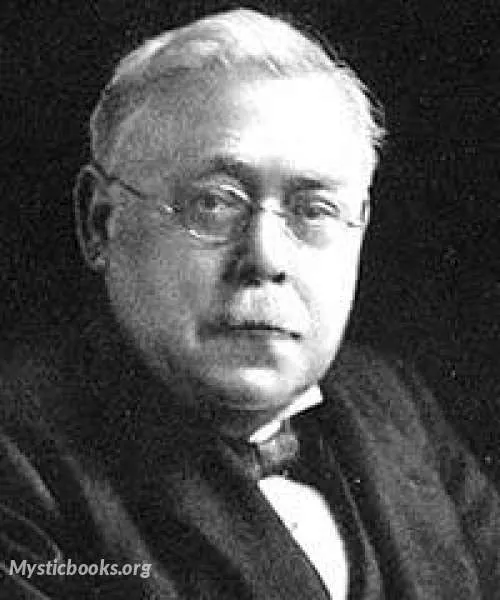
Timeline
Title
Country/Nationality
E.A. Wallis Budge
Sir Ernest Alfred Thompson Wallis Budge was an English Egyptologist, Orientalist, and philologist who worked for the British Museum and published numerous works on the ancient Near East. He made numerous trips to Egypt and the Sudan on behalf of the British Museum to buy antiquities, and helped it build its collection of cuneiform tablets, manuscripts, and papyri. He published many books on Egyptology, helping to bring the findings to larger audiences. In 1920, he was knighted for his service to Egyptology and the British Museum.
- A. Wallis Budge was born in 1857 in Bodmin, Cornwall, to Mary Ann Budge, a young woman whose father was a waiter in a Bodmin hotel. Budge's father has never been identified. Budge left Cornwall as a boy, and eventually came to live with his maternal aunt and grandmother in London.
Budge became interested in languages before he was ten years old, but left school at the age of twelve in 1869 to work as a clerk at the retail firm of W.H. Smith, which sold books, stationery and related products. In his spare time, he studied Biblical Hebrew and Syriac with the aid of a volunteer tutor named Charles Seeger. Budge became interested in learning the ancient Assyrian language in 1872, when he also began to spend time in the British Museum. Budge's tutor introduced him to the Keeper of Oriental Antiquities, the pioneer Egyptologist Samuel Birch, and Birch's assistant, the Assyriologist George Smith. Smith helped Budge occasionally with his Assyrian. Birch allowed the youth to study cuneiform tablets in his office and obtained books for him from the British Library of Middle Eastern travel and adventure, such as Austen Henry Layard's Nineveh and Its Remains.
From 1869 to 1878, Budge spent his free time studying Assyrian, and during these years, often spent his lunch break studying at St. Paul's Cathedral. John Stainer, the organist of St. Paul's, noticed Budge's hard work, and met the youth. He wanted to help the working-class boy realize his dream of becoming a scholar. Stainer contacted W.H. Smith, a Conservative Member of Parliament, and the former Liberal Prime Minister William Ewart Gladstone, and asked them to help his young friend. Both Smith and Gladstone agreed to help Stainer to raise money for Budge to attend the University of Cambridge.
Budge studied at Cambridge from 1878 to 1883. His subjects included Semitic languages: Hebrew, Syriac, Ge'ez and Arabic; he continued to study Assyrian independently. Budge worked closely during these years with William Wright, a noted scholar of Semitic languages, among others.
In 1883 he married Dora Helen Emerson, who died in 1926.
Budge entered the British Museum in 1883 in the recently renamed Department of Egyptian and Assyrian Antiquities. Initially appointed to the Assyrian section, he soon transferred to the Egyptian section. He studied the Egyptian language with Samuel Birch until the latter's death in 1885. Budge continued to study ancient Egyptian with the new Keeper, Peter le Page Renouf, until the latter's retirement in 1891.
Between 1886 and 1891, Budge was assigned by the British Museum to investigate why cuneiform tablets from British Museum sites in Iraq, which were to be guarded by local agents of the Museum, were showing up in the collections of London antiquities dealers. The British Museum was purchasing these collections of what were their "own" tablets at inflated London market rates. Edward Bond, the Principal Librarian of the Museum, wanted Budge to find the source of the leaks and to seal it. Bond also wanted Budge to establish ties to Iraqi antiquities dealers in order to buy available materials at the reduced local prices, in comparison to those in London. Budge also travelled to Istanbul during these years to obtain a permit from the Ottoman Empire government to reopen the Museum's excavations at these Iraqi sites. The Museum archaeologists believed that excavations would reveal more tablets.
Budge was knighted in the 1920 New Year Honours for his distinguished contributions to Colonial Egyptology and the British Museum. In the same year he published his sprawling autobiography, By Nile and Tigris.
He retired from the British Museum in 1924, and lived until 1934. He continued to write and published several books; his last work was From Fetish to God in Ancient Egypt (1934).
Books by E.A. Wallis Budge
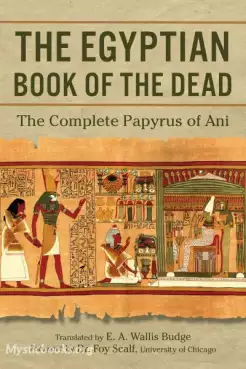
The Egyptian Book of the Dead
The Book of the Dead is an ancient Egyptian funerary text generally written on papyrus and used from the beginning of the New Kingdom (around 1550 BCE) to around 50 BCE. The original Egyptian name for the text, transliterated rw nw prt m hrw, is tran...
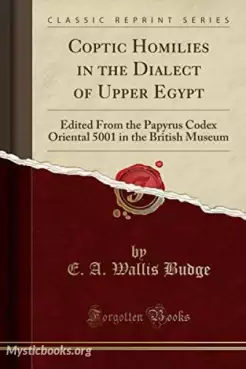
Coptic Homilies in the Dialect of Upper Egypt
The present work contains the Coptic versions of ten Greek Homilies on fasting, repentance, the end of the world, the Incarnation, etc., which are attributed to John the Faster, Athanasius of Alexandria, Proclus of Cyzicus, Eusebius and Basil of Caes...
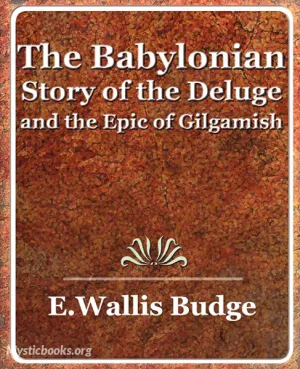
The Babylonian Story of the Deluge and the Epic of Gilgamesh: with an Account of the Royal Libraries of Nineveh
The book is a fascinating exploration of two of the oldest known works of literature in human history, providing readers with valuable insights into the ancient cultures and civilizations that created them. The first half of the book focuses on the...
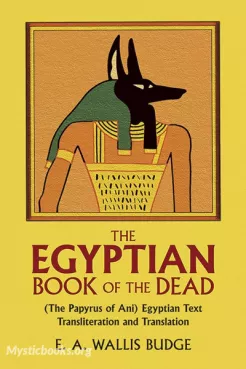
The Book of the Dead
What happens after we die? The Book of the Dead, an ancient Egyptian funerary text, provides guidance for the soul on its journey to the afterlife. This fascinating book contains spells, prayers, and incantations that were designed to help the decea...